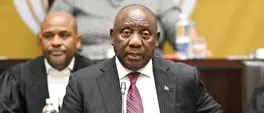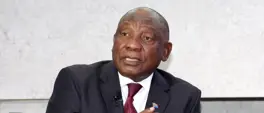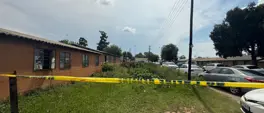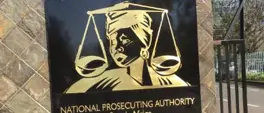MALAIKA MAHLATSI: Dada Morero’s argument deserved better engagement than it received
Malaika Mahlatsi
28 August 2024 | 15:25The challenge of language skills within law enforcement poses a serious threat to our country beyond the apprehension of criminals from other countries, writes Malaika Mahlatsi.
Last weekend, City of Johannesburg Mayor and Johannesburg regional chairperson of the African National Congress (ANC), Dada Morero, addressed an ANC's regional executive committee (REC) meeting, and made an argument that caused a storm in the province.
Morero argued that the Johannesburg Metro Police Department (JMPD) should consider hiring foreign nationals to help in the fight against crime.
The basis of his argument was that law enforcement is battling to curb crime in some hotspots on account of investigative failures, resulting from a language barrier between officers and foreign nationals, who sometimes plan their defences in full view of law enforcement officers in their indigenous languages.
This, according to Morero, makes it difficult to apprehend and prosecute foreign nationals accused of committing crimes in the Gauteng province in general, and Johannesburg in particular.
The recommendation was rejected by the ANC REC.
Morero’s address was leaked to the public, causing an uproar, with most people arguing that the hiring of foreigners in a country battling with high levels of unemployment was irrational.
There is some legitimacy to this argument.
Two weeks ago, Statistics South Africa (StatsSA) released the debilitating unemployment figures that indicate that the official unemployment rate now stands at 33.5%, an increase of 0.9 of a percentage point in the second quarter of 2024 compared to the first quarter, where the number stood at 32.9%.
The number of unemployed individuals has increased by just over 158,000, reaching 8.4 million. This marks the highest figure since comparable records began in 2008.
In terms of the expanded definition of unemployment, which includes individuals who are discouraged and have stopped looking for work, stands at 42.6% - an increase from 41.9% in the first quarter of the current year.
Job losses were experienced in most sectors, including finance, trade, agriculture, construction and private households.
Young people are on the receiving end of crisis of joblessness. According to StatsSA, in the second quarter of 2024, the youth unemployment rate increased to 60.80% from 59.70% in the first quarter. These figures cement South Africa’s place as a country with one of the highest unemployment rates in the world.
There is no question that the situation is dire. Such high levels of unemployment are a recipe for disaster.
In its recently published report on the 2021 July Riots, where protests led to widespread looting, violence and the destruction of property, and the deaths of more than 350 people, the South African Human Rights Commission (SAHRC) identified rising levels of unemployment as one of the key underlying reasons for the protests.
Scholars have also done research on the impact of unemployment, arguing it is one of the main causes of instability in the country. Feminist activist and scholar Phindile Kunene, in her Masters dissertation giving a historical analysis of local struggles in the township of Phomolong in the Free State province between 1985 and 2005, observed that service delivery protests were increasingly being led by young people, and that these protests were also becoming increasingly violent.
Several other researchers concur with Kunene’s arguments, adding other socio-economic challenges that arise from unemployment, including homelessness, political unrest and even mental health problems.
Thus, it makes sense that Morero’s proposal, coming just a week after StatsSA released debilitating unemployment figures, and in an environment of social instability in Johannesburg particularly, was met with such strong rejection by South Africans.
At the heart of the uproar is the argument that the South African government cannot prioritise foreign nationals for employment opportunities when millions of citizens are jobless. This argument is reasonable.
However, in the noise about the proposal for JMPD to hire foreign nationals, an important issue that begs for reflection has been completely buried and its repercussions ignored.
The challenge of language skills within law enforcement poses a serious threat to our country beyond the apprehension of criminals from other countries.
In a study titled “Overcoming language barriers: An exploration of the police perceptions of the digitisation of witness statements in South Africa”, published in a 2023 issue of the International Journal of Research in Business and Social Sciences, researchers found language barriers in the South African Police Service (SAPS), and troubling issues related to language from numerous police stations across the diverse township of Soweto.
Amongst other results, the study identified instances where the English version of sworn statements was an inaccurate translation of indigenous statements provided by witnesses or complainants.
This has far-reaching implications, not least being that perpetrators of crime may not be convicted, based on what the courts may deem unreliable witness statements.
Furthermore, victims of crimes may not get the justice they deserve based solely on problems of translation, which impact the credibility of their complaints.
This issue goes to the very heart of the Constitution.
The Bill of Rights, a cornerstone of democracy in South Africa, aims to enshrine the rights of all people in our country, and to affirm the democratic values of human dignity, equality and freedom.
The very first right stated therein is the right to equality, about which the Constitution states: “Everyone is equal before the law and has the right to equal protection and benefit of the law.”
The inadequacies of law enforcement agencies with regard to language capacity makes it impossible for victims of crime, in particular, to enjoy the benefit of the law. This is because such a benefit is not possible when tools needed to render justice are inadequate.
Our country has one of the lowest prosecution and conviction rates in the world. Consider crime statistics from the 2019/2020 to 2021/2022 periods, in the mass murder category. There were 2,446 incidents of mass murder, with 5,709 victims.
However, only 1,511 arrests were made. More shocking is that during this period, only 103 criminals were convicted. The arrest and conviction trends are the same across all crime categories.
Morero’s proposal may have not been adequate, largely because it did not address the deeper structural and systematic issues facing law enforcement agencies in Johannesburg and South Africa broadly, one of which is chronic under-funding.
Furthermore, hiring foreign nationals does not address the very serious issue of lack of language capacity within law enforcement across the board.
Hiring foreign nationals for hotspot areas does not respond to the issues faced even by South African victims and complainants when dictating affidavits about crimes committed by other South Africans.
The issue is not about indigenous languages from other African countries as Morero stated, but about indigenous languages in general.
The government must invest significantly in language training services for all law enforcement officers, and interpretation services must be better capacitated.
Failing to do this is a denial of justice to millions of South Africans. And this is why I believe that Morero’s argument needed deeper engagement beyond the issue of the proposed employment of foreign nationals.
Unfortunately, the debate that Morero wanted to pose happened in a climate of volatility, resulting in a missed opportunity to expand on it while removing the wheat from the chaff.
Malaika is a geographer and researcher at the Institute for Pan African Thought and Conversation. She is a PhD in Geography candidate at the University of Bayreuth in Germany.
Get the whole picture 💡
Take a look at the topic timeline for all related articles.















